- Home
- Melissa Marr
Radiant Shadows tf-4 Page 9
Radiant Shadows tf-4 Read online
Page 9
“Would I be alive at the end?”
“Perhaps.” Bananach crouched before her and gazed up at her. “I cannot see that clearly yet.”
“Oh.” Ani looked around for an exit. Fighting wasn’t an option, not against Bananach. Ani could run though, not like the fastest Hounds, but faster than most faeries.
Faster than her?
Bananach petted Ani’s arm like she was a stray dog. “There’s something special inside you, and I need it. I’m offering you the chance to keep breathing while I take it.”
“I—”
“First, you will kill Seth… and Niall. Perhaps Niall first. You aren’t bound by fealty as I am. They won’t suspect you.” Bananach reached up and stroked Ani’s face. “You will do this. Then you will come to me and give me your blood.”
Ani shuddered. The sliver of mortality she carried wasn’t just a limitation on her strength: despite her best efforts, it also meant she was less cruel than her court. Considering the murder of those she knew felt wrong. She forced herself not to flinch and asked, “Or?”
Bananach crowed. “No ‘or.’ There aren’t choices, child. Disobeying me would be very… foolish. I will come for you.”
The thoughts in Ani’s mind, the threat to those she loved if Bananach came after Ani… it was more than Ani could process.
“You were born for this. If he’d killed you, it would be different, but he didn’t, did he?” Bananach stood and stepped back. “He wants me to win. That’s why he let you live. For me.”
“If who killed me?”
“I am done with speech. Run along and do as I bid, or I will be displeased.” Bananach turned away and left Ani sitting in the midst of forges and computers. The raven-faery wasn’t even looking, so—half expecting resistance—Ani ran. She threw herself across the room with a speed she’d rarely found. In that instant, she was every bit the daughter of Hounds, every breath a Hound herself.
No mortality slowed her, and no one stopped her.
Chapter 13
Devlin stood at the mouth of the alley as the Hound left. With her blood as his guide, he’d followed her trail to Irial and Niall’s house, and then to War’s den. What were you doing, Ani? He wanted to follow. It was illogical that she should matter. If she were dead, she wouldn’t. He’d thought about her death as he waited outside the Dark King’s home, thought about the terror inside of him as he stood outside Bananach’s nest.
Then Ani was gone.
“She’s unpredictable,” Bananach whispered into his ear. Her black feathers brushed against him as she embraced him.
Devlin stepped away.
She slid around the front of him, talon-tipped hands spearing into his sides. “Chaos sheathed in skin. Too much for you, darling Brother.”
He took her wrist in his hand and squeezed enough to fracture her delicate bird bones, giving her the pain she enjoyed. “Must you try to provoke me?”
Bananach laughed, a grating caw that was accompanied by a congress of ravens on the rooftop above them. She cradled her wrist happily. “Have dinner with me, Brother. I am lonely.”
“What business do you have with her?”
Bananach didn’t pretend confusion. “She will free me. Her blood’s the secret they didn’t want us to know.”
“What about her blood is import—”
“Tsk. Tsk.” Bananach covered his mouth with her hand. “No questions. She’s special, and I need her.”
Devlin removed Bananach’s hand. “You do?”
“Of course.” She crowed, and the bevy of black-winged birds replied to her.
“You need the Hound,” he repeated.
Bananach looked on him with pride. “And you know why, don’t you? That’s why you didn’t kill her. I see it now. She’s the key. With her blood, I can win. After all this time, Brother, I can defeat Reason.”
“Why I didn’t…”
“Kill her.” Bananach caressed his cheek. “When they brought her to the Dark Court, brought her in like a little lamb among the wolves, I saw her difference. I listened. I know it was you who didn’t end her life.”
Devlin stared at his sister, mute and afraid. His hands did not tremble. Could I silence her? He couldn’t kill her any more than he could kill Sorcha. How do you eliminate problems you cannot kill?
“Someone came in the night and slaughtered the little lamb’s mother, and the Dark King himself has protected her all these years.” Bananach’s thumb stroked the skin under his eye. Her talon scraped the flesh so that a small cut trickled between his skin and her palm. “And you… I saw you watching her at their club. I knew.”
He had no idea what to say. Truth or misdirection could go poorly, but leaving would end any chance of learning what she sought from Ani. “You notice much.”
She smiled. “It was a test, but I—”
“Not a test.” He reached up to Bananach’s hand and pulled it away from his face. Entwining his fingers with hers, he added, “I would not test you.”
Bananach sighed. “You did, but I figured it out. The little one’s blood will give me strength they cannot fathom.”
“Indeed.” Devlin felt the stirrings of a fear that he’d never felt before, not for queen, or court, or Faerie itself. It was for Ani—but after an eternity of repressing emotions, he shoved the fear inside where his sister would not notice and gave her words she’d expect of him. “You would fight the High Queen then.”
“Of course!”
He stared at Bananach, not arguing, not speaking.
She donned a glamour to look like Sorcha and laughed happily. “You’re such a perverse child, Dev. I always knew you’d betray me. When I heard what you’d been doing”—Bananach paused, still dressed in the High Queen’s image—“I was shocked. Disappointed. You’re nothing like me, Devlin. You don’t belong in Faerie. You never really did.”
“Stop.”
Bananach’s own visage returned. “You’ve always liked her better, haven’t you?”
She leaned heavily against a chain-link fence. The force of her body flopping against it made the metal rattle unpleasantly.
Devlin faced her. “Do I tell her where you hide?”
“If she hid, would you tell—”
“Stop.” Devlin’s calm was evaporating steadily. “She is my queen. She gives me home and life and reason to be.”
“One day I’ll take my rightful court or kill her, and then you’ll swear loyalty to me.” Bananach looked heart- broken as she said it. For centuries, she’d fixated on the same thing—not always, not even regularly, but when she was lost, her fallback plan was regency and sororicide. “You’ve used the Hound as a test, but I see what she can do for us. You doubted that I’d figure it out, but I did.”
“I don’t test you, Sister,” he repeated. He didn’t add that tests were their domain. Bananach’s entire relationship with him was solely about competition with her twin, Sorcha. He was just an instrument to be wielded in their conflict.
“Where shall we dine?” he asked.
“We could stop for a bit of killing?”
“Perhaps.” He’d done worse in her company—and not always at her behest.
And she was appeased. She linked her arm around his waist, and he obediently draped his arm across her shoulder. She adjusted the fall of her feather-hair so it wasn’t pinned by his hold but fell like a solid cloak over his arm and down her back.
Afterward, he walked to the one house where he knew neither sister would want him to be, seeking not the king but the one in the Dark Court who’d best know how to deal with his sisters. A thistle-fey admitted him, led him to a room accessed by sliding a large surrealist painting to the side, sealed him in, and fled.
In the darkened room, Devlin found the faery he sought: Irial wasn’t a monarch, but he retained enough power that if he truly wanted his court back, he could take it. He was not king, but not just a faery. Like me. There were some stronger faeries in the courts, but most of the truly strong ones were solitary—unl
ess something more than power motivated them.
Two chairs sat on either side of the divan where the former Dark King now lounged.
Irial lifted a decanter from one of the alcoves in the wall. He poured a glass and held it up. “Drink with me?”
Devlin nodded, so Irial poured a second glass.
Irial held out a glass. “Many a good evening can start with a willing mortal… or a halfling perhaps.”
Devlin ignored the intimation that Irial knew about Ani. He accepted the glass and took a seat on the chair to Irial’s right. “Perhaps, but that’s not appropriate for those of my court.”
“And which court would that be, Devlin?” Irial never missed a chance to ask that particular question. Like the Dark Kings and Dark Queens before him, Irial saw things that Devlin would rather keep locked away.
“I belong to Sorcha’s court,” he said.
“Why? You aren’t like them. We both know that. If—”
“Stop.” Devlin drank, keeping his expression bland as he watched Irial. “I have no interest in what you think you know.”
“Aaah. You certainly are cruel enough to be High Court.” Irial looked briefly wounded, but the momentary sadness faded under the faery’s habitual wicked expression.
Devlin thought—not for the first time—how much different life would’ve been if he’d claimed the Dark Court when it was first created. Irial, like all the Dark Kings before him, was temptation personified. He had no need to repress his baser urges; he had no need to hide anything.
Unlike me.
Irial lifted his glass, peering into the amber liquid as if he’d see some truth waiting there. “You were at the Crow’s Nest.”
“I was sent to ensure that Seth is safe.”
“I see.” Irial took a drink and let the silence stretch out. “You could speak to my king if you have doubts of the boy’s safety. Shall I see if he’s in?”
Devlin weighed his words. It wasn’t as if he’d never conducted business without his queen’s consent; eternity was a long time not to chafe against the bounds of being ruled. He’d only acted without orders when it was for his court or queen’s best interests—or when there were no consequences to measure.
Except for Ani.
Devlin set his glass aside. “I’m not here about Seth, but I expect that you already know that.”
“Indeed.”
Devlin hated the necessity of speaking about it, of admitting to anyone that it mattered to him that Ani was vulnerable, but pride wasn’t a luxury he could have just then. “Ani is in danger, and I would like to keep her safe.”
The laughter that rolled out of Irial then held every dark thing that had once thrived in Faerie. “I doubt that safe is what Ani seeks.”
Devlin ignored that truth and added, “Ani is of interest to my sister. I would like to take her away from Huntsdale, but I suspect if I did so without informing her court, we’d be pursued.”
The guise of debauched layabout vanished. Irial’s smile was akin to an animal’s bared teeth. “Do you think I’ve hidden her only to have you take her to Faerie?”
“She is not being retrieved for Faerie. It would be best not to take her there…. Because of my involvement in Ani’s life, Sorcha does not See her.” Devlin said the words quietly.
Irial was silent.
“Now that Ani has come to your court, she is unsafe. Bananach has taken an interest in her too,” Devlin added.
“And why does the High Queen’s Bloody Hands involve himself in the safety of a Hound?” Irial swirled his drink. “It’s a conundrum. Wouldn’t you say?”
“Does it really matter?” Devlin asked.
“Perhaps. I suspect it matters to Bananach—and to Sorcha. It would matter to me if those I trusted were keeping such secrets. Do you suggest that it wouldn’t matter to them? To your queen especially?”
Irial wasn’t saying anything that Devlin didn’t already know. All faeries knew the importance of fealty. Once sworn to a king or queen, obedience was to be absolute. Devlin was acting in direct opposition to his queen’s orders—not only had he let Ani live, but he was working now to keep her alive instead of protecting Seth. Few faeries were likely to think that he would disobey his queen—except, of course, his queen herself.
Hasn’t she always known the day would come?
Time passed without words or sounds. It was akin to being in the High Court, silence and contemplation.
Finally, Irial said, “If Ani goes with you by choice, I will dissuade Gabriel and Niall from pursuing you. If she refuses, we will protect her here. It’s her choice though. Your vow on it.”
Devlin stood. “You have my vow that the choice is hers.”
Irial frowned up at him. “Be careful with her.”
“She’ll be safer than if she were in your court.” Devlin turned to leave.
“Devlin?”
Devlin paused with one hand on the door.
“Be careful with her as well. Ani’s not like any other faery.” Irial’s look was pitying.
“I am the High Queen’s Bloodied Hands.” Devlin straightened his shoulders and dropped enough of the control he’d held over his emotions to let the dark faery know that pity wasn’t necessary. “In all of eternity, no faery born has overcome me in anything.”
“Aaah. Pride goeth before the fall, my friend”—Irial stood and clasped Devlin’s hand—“but you’ve already fallen, haven’t you?”
And to that, Devlin had no answer.
Chapter 14
It was finally dark in Faerie, so Rae took advantage of the opportunity to leave the cave for a while. The world around her looked less full than usual, but Rae had long since grown used to the changing landscape of Faerie. The High Queen’s moods determined reality, and some days the queen decided to create a new vista.
Rae drifted over a stream that had been a river previously. On either side, willows clung to the banks in clusters like groups of people in conversation. Thin branches swayed in a light breeze. Reclining on the soil with her bare feet dangling over the edge of the bank was a beautiful faery, one Rae hadn’t met in dreams or in Devlin’s body before. The faery slept on the mud-slick ground, a pile of moss under her cheek as if the earth had formed a pillow just for her. Bits of mud, twigs, and reeds were caught in a fiery mass of hair. Unlike the majority of the High Court faeries, this one looked like she belonged elsewhere, as if she had stepped from some Pre-Raphaelite painting of sensual women.
Rae entered the faery’s dream.
“I don’t know you,” the faery said. In her dream, she was sitting on the bank of a much larger river. Lilacs bloomed at the edge of a lush garden that stretched into the distance.
Rae drew a deep breath. In dreams, her senses were as if real. The perfume of flowers lay heavy on her tongue, so thick that she was near to choking on it.
“Where do you come from?” the faery prompted.
“Perhaps you saw me in the streets, and you’re remembering me.” Rae was used to the High Court faeries resisting her presence in their minds. It wasn’t logical to dream of strangers, so they often needed gentle guidance to accept that she was imagined.
“No.” The faery shook her head. Her hair was unbound, tumbling down her back and trailing behind her onto a flower-dotted ground. There were no twigs or mud entangled in the curls here.
The faery turned away from Rae, staring into the water as if it were a giant mirror. Faces drifted under the surface like Ophelia drowned and tragic. Has she lost someone? Death was so much larger to faeries. When one had the promise of eternity, centuries seemed a blink. Rae had seen the reality of such loss when Devlin considered what he did for his queen. Her orders were blood on Devlin’s hands.
“What do you dream of?” Rae whispered.
The faery didn’t look away from the water. Silver veins like roots crept from the faery’s skin and sank into the earth, anchoring her to the soil. Rae was transfixed by the sight: faeries weren’t ever this unusual in their self- imagini
ngs. They saw themselves much as they appeared in their waking world; their essential representation echoed reality. They were of the High Court, logical in this as in all things.
“My son is gone from me.” The faery looked back at Rae. “He’s gone, and I can’t see him.”
Rae’s heart ached for her. Faeries had so few children that the loss of one must hurt even more than the loss of most faeries. Rae sat beside her, carefully not brushing the roots that extended from the faery’s hands, arms, and feet. “I’m sorry.”
“I miss him.” Six tears slid down the faery’s cheeks. They fell to the soil and rested on the ground like drops of mercury.
Rae gathered them into her hands and carried them to the edge of the river. With her words, she reshaped the water, stretching it and widening it until it became an ocean.
“Seven tears into the sea,” she told the faery.
Then she returned to the faery’s side and knelt. With one hand outstretched, Rae added, “Seven tears for a wish.”
She caught a seventh tear as it fell.
The faery was silent as Rae flung it into the water.
“What do you wish for? As long as you’re sleeping, you can have it.” Rae stayed kneeling beside her. “Tell me what you wish for.”
The faery woman stared at Rae. Her voice was as a slight breeze, but she said the words, made her wish. “I want to see my son, my Seth.”
Behind them the sea vanished, and in its place a mirror appeared. The glass was framed by vines hardened and blackened like they’d been darkened in fire. In the mirror, Rae could see a faery unlike any others she’d glimpsed and very unlike the austere appearance of most High Court faeries. Seth had silver jewelry decorating his eyebrows; a silver ring pierced his lower lip; and a long silver bar with arrow- like tips pierced the top curve of one ear. Blue-black hair framed a face that wasn’t faery-pretty, but mortal-hungry. Seth didn’t look anything like the son of the vibrant faery.
Is he why she sees herself with silvered anchors?
Seth was fighting with a group of faeries with moving ink on their forearms. If they’d been mortals, Rae would guess that they were the sort of people one should cross streets to avoid. In the mirror, Seth wrapped his arms around a muscular female faery and propelled the two of them through a window. Broken glass hit the cement floor inside of a bleak- looking room.

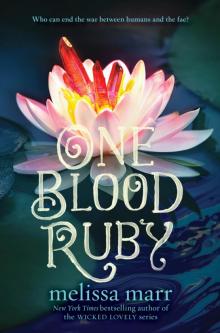 One Blood Ruby
One Blood Ruby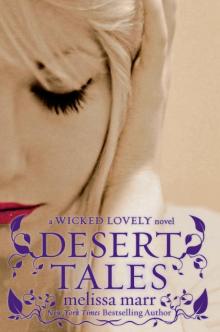 Desert Tales
Desert Tales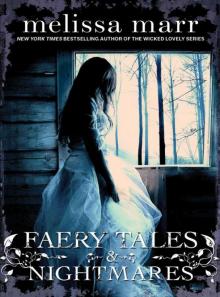 Faery Tales & Nightmares
Faery Tales & Nightmares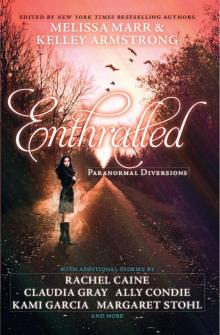 Enthralled: Paranormal Diversions
Enthralled: Paranormal Diversions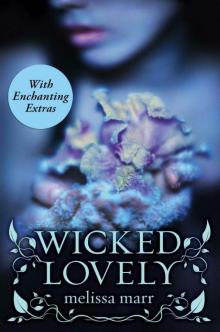 Wicked Lovely
Wicked Lovely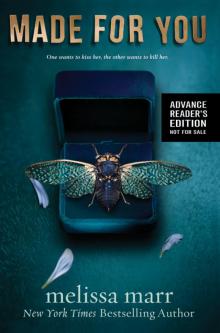 Made for You
Made for You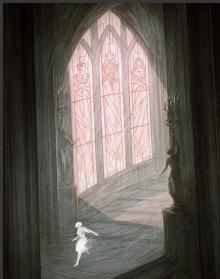 The Maiden Thief
The Maiden Thief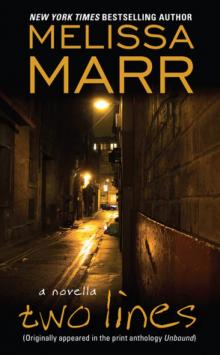 Two Lines
Two Lines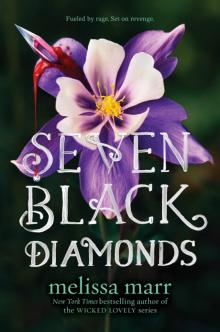 Seven Black Diamonds
Seven Black Diamonds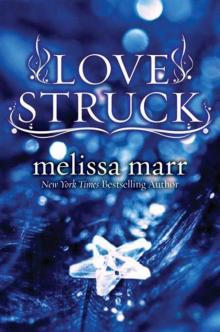 Love Struck
Love Struck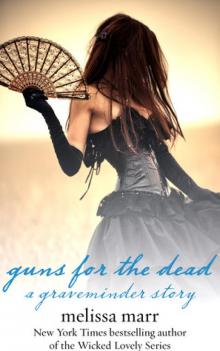 Guns for the Dead
Guns for the Dead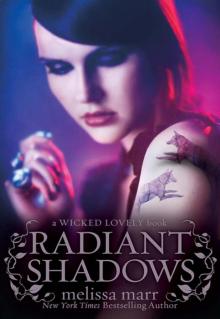 Radiant Shadows
Radiant Shadows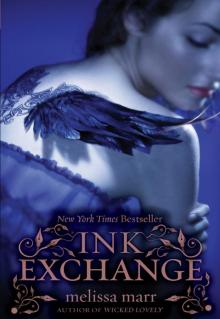 Ink Exchange
Ink Exchange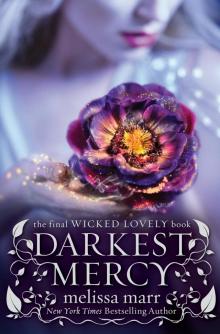 Darkest Mercy
Darkest Mercy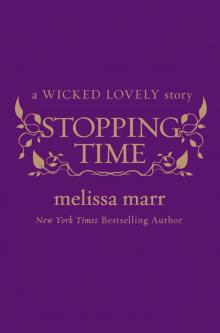 Stopping Time and Old Habits
Stopping Time and Old Habits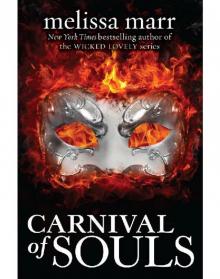 Carnival of Secrets
Carnival of Secrets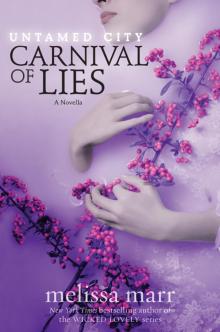 Carnival of Lies
Carnival of Lies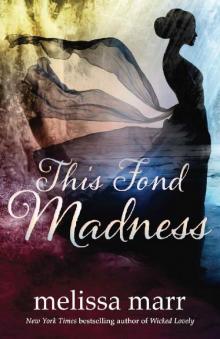 This Fond Madness
This Fond Madness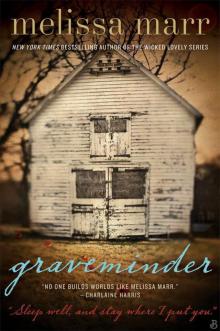 Graveminder
Graveminder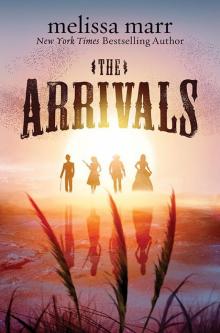 The Arrivals
The Arrivals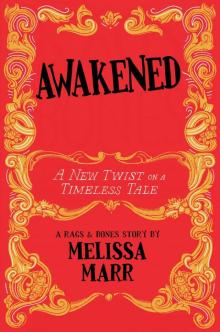 Awakened: A New Twist on a Timeless Tale
Awakened: A New Twist on a Timeless Tale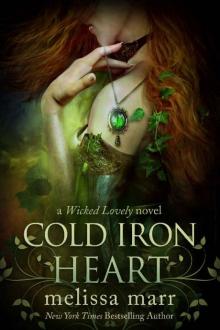 Cold Iron Heart: A Wicked Lovely Novel
Cold Iron Heart: A Wicked Lovely Novel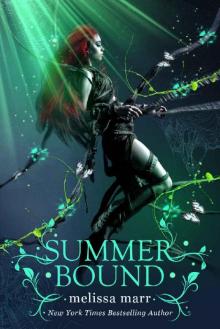 Summer Bound: A Wicked Lovely Story
Summer Bound: A Wicked Lovely Story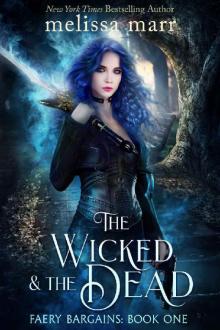 The Wicked & The Dead (Faery Bargains Book 1)
The Wicked & The Dead (Faery Bargains Book 1)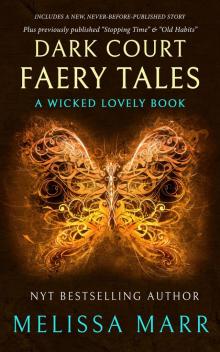 Dark Court Faery Tales
Dark Court Faery Tales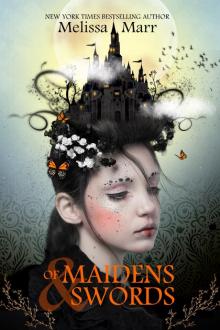 of Maidens & Swords
of Maidens & Swords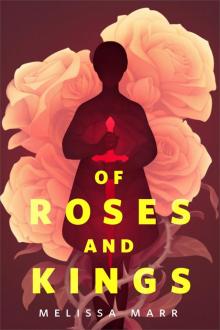 Of Roses and Kings
Of Roses and Kings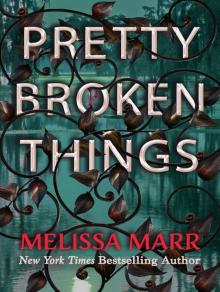 Pretty Broken Things
Pretty Broken Things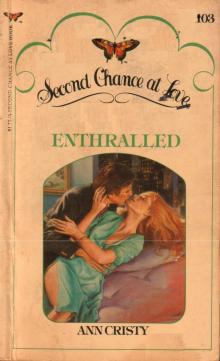 Enthralled
Enthralled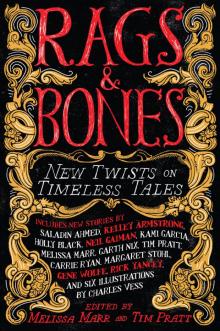 Rags & Bones
Rags & Bones Ink Exchange tf-2
Ink Exchange tf-2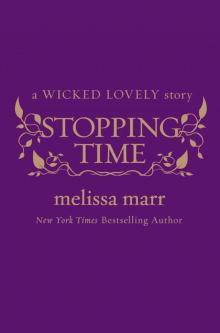 Stopping Time
Stopping Time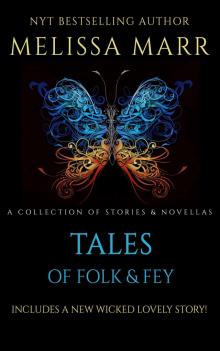 Tales of Folk & Fey
Tales of Folk & Fey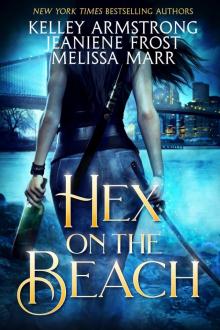 Hex on the Beach
Hex on the Beach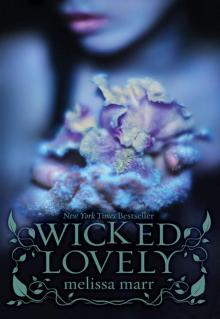 Wicked Lovely Free with Bonus Material
Wicked Lovely Free with Bonus Material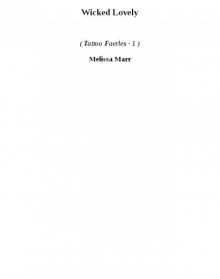 Wicked Lovely tf-1
Wicked Lovely tf-1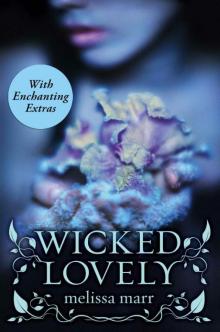 Wicked Lovely with Bonus Material
Wicked Lovely with Bonus Material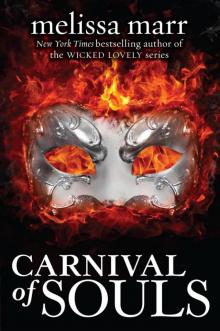 Carnival of Souls cos-1
Carnival of Souls cos-1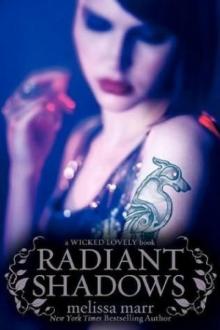 Radiant Shadows tf-4
Radiant Shadows tf-4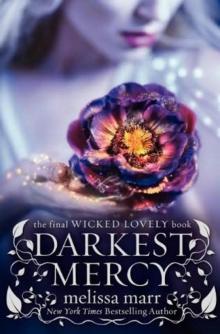 Darkest Mercy tf-5
Darkest Mercy tf-5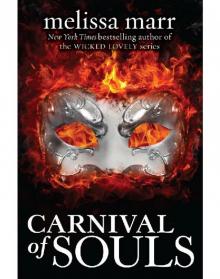 Carnival of Souls
Carnival of Souls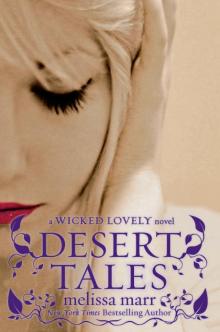 Desert Tales: A Wicked Lovely Companion Novel
Desert Tales: A Wicked Lovely Companion Novel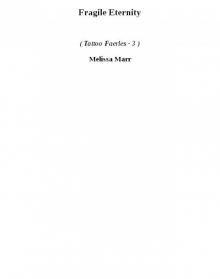 Fragile Eternity tf-3
Fragile Eternity tf-3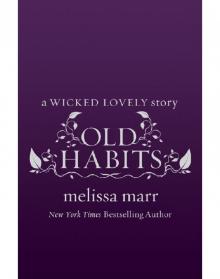 Old Habits
Old Habits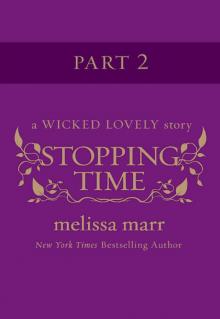 Stopping Time, Part 2
Stopping Time, Part 2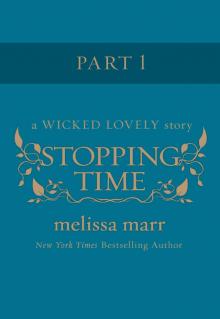 Stopping Time, Part 1
Stopping Time, Part 1